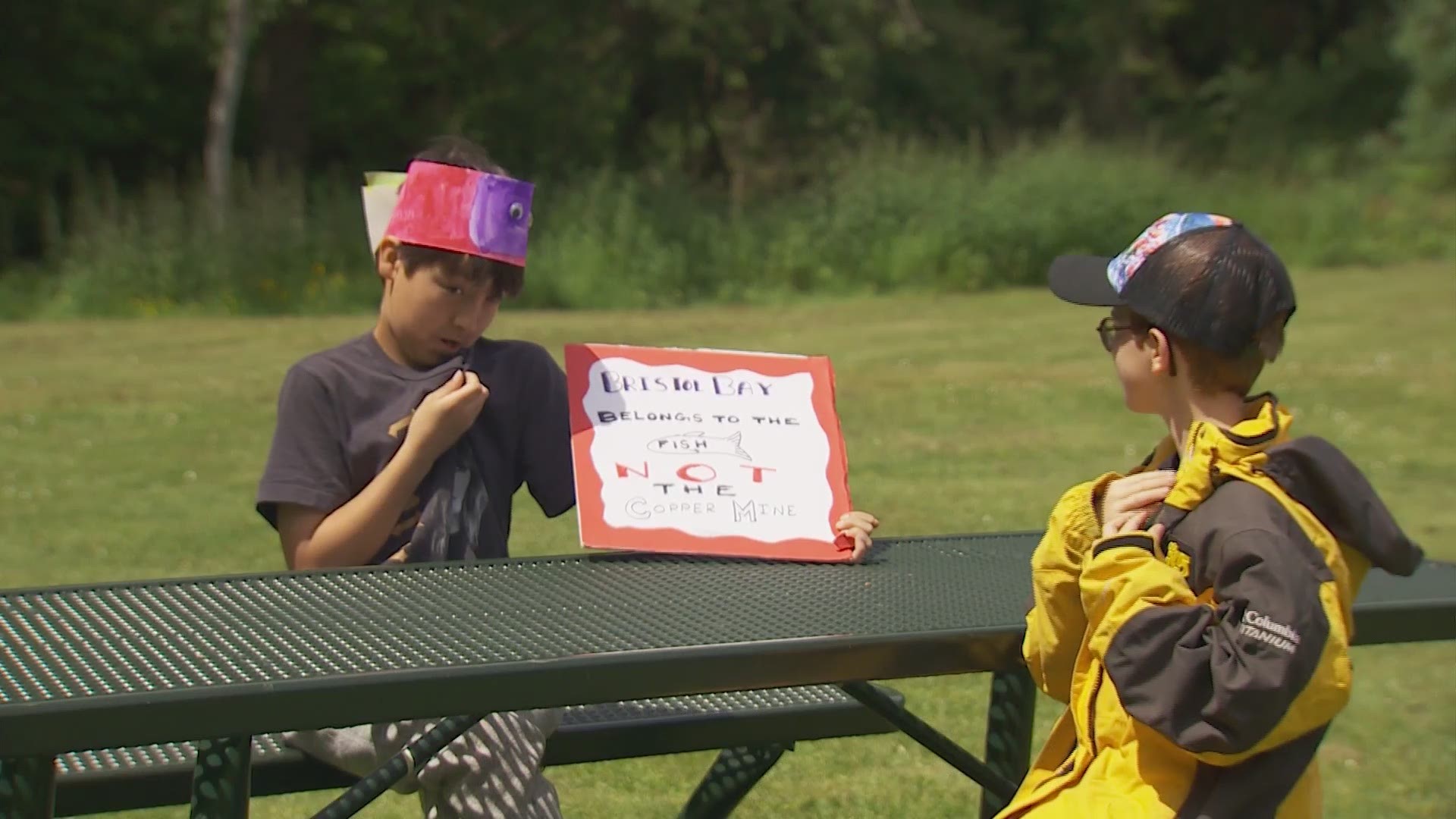KIRKLAND, Wash. — Earlier this week, a group of students from Discovery Community School gathered outside the KING 5 studio holding signs about saving wild salmon.
We soon learned the students are raising awareness about a proposed copper mine in Bristol Bay, Alaska, the home of one of the last fully wild salmon runs left.
Fourth-grader Lucas Robbins and his classmates met us at a park in Kirkland to explain what they’re doing to get their peers involved.
"We want to keep the salmon alive because they provide a lot of stuff to us," explained Diego Kaperick.
According to the U.S. Environmental Protection Agency (EPA) website, Bristol Bay is the “most abundant salmon species in the watershed is sockeye salmon. The Bristol Bay watershed supports the largest sockeye salmon fishery in the world, with approximately 46% of the average global abundance of wild sockeye salmon. Between 1990 and 2010, the annual average inshore run of sockeye salmon in Bristol Bay was approximately 37.5 million fish. Annual commercial harvest of sockeye over this same period averaged 27.5 million. Approximately half of the Bristol Bay sockeye salmon production is from the Nushagak River and Kvichak River watersheds."
"If we don't save the salmon then over 100 animals including us will have one less food source that they very much depend on for food," said Kiernan Brown.
No hatchery fish are raised or released in the watershed, so Bristol Bay's salmon populations are entirely wild. The Pebble Mine would be built at its headwaters.
"We have restored process, reviewed comments, and heard from a variety of stakeholders on whether to withdraw the proposed restrictions in the Bristol Bay watershed," Administrator Scott Pruitt said in a January 2018 EPA press release. "Based on that review, it is my judgment at this time that any mining projects in the region likely pose a risk to the abundant natural resources that exist there. Until we know the full extent of that risk, those natural resources and world-class fisheries deserve the utmost protection. Today's action allows EPA to get the information needed to determine what specific impacts the proposed mining project will have on those critical resources."
The EPA calculates the Bristol Bay watershed generated nearly $480 million in direct economic expenditures and sales in 2009 and provided employment for over 14,000 full- and part-time workers.
"I never knew salmon was this important,” said Natalie Stevens. “I was really surprised. When I came home, I talked to my dad about it. My dad is like, 'OK salmon is pretty important, I actually never knew that.' My mom was pretty surprised, too. My sister didn't even care."
The kids first learned about Bristol Bay by watching a clip from the documentary "The Breach" by Seattle filmmaker Mark Titus, who visited their class.
They've created a campaign called "School of Salmon" to challenge other schools across the country to protect salmon in Bristol Bay and everywhere.
"We are going to challenge different schools all around the country to spread awareness about Bristol Bay and saving the salmon. Just like how a school of salmon moves back to where they were born, hopefully, it will curve back around to us," said Clara Bannon. "A lot of kids think that they’re just one kid and they can’t make much of a difference. But when all of us get together we can really make a change in the world."
"We started doing it and maybe other kids in the world might actually think the same thing and this can make a difference for all kids if they work hard," said Ali Adams.
The U.S. Army Corps of Engineers is reviewing a Clean Water Act permit application from the Pebble Limited Partnership and has started the Environmental Impact Statement (EIS) process. The Corps issued a Draft EIS for public review in February 2019. The public comment period runs through May 30, 2019.
For more information or to share your comment, visit the Corps' Pebble Project EIS website.

